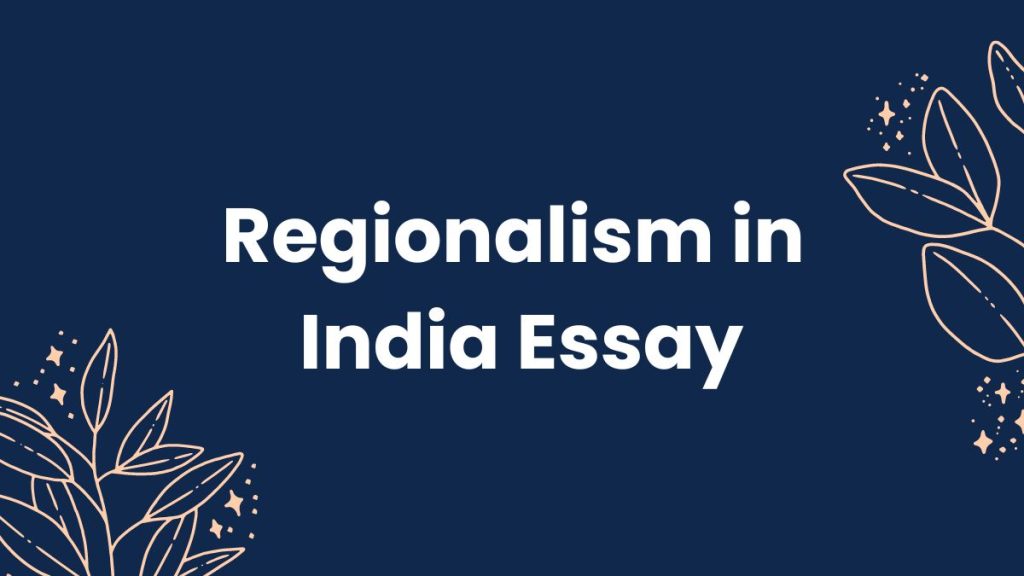Essay on Regionalism In India: Regionalism refers to the political ideology or sometimes an expression that fixates more on a region than the entire nation as a whole. While it can be considered fruitful for regional development, it strikes a major threat to the overall development as well as the unity of the nation if twisted far too much. Regionalism has been an efficient strategy even before the independence of India. In this article, we will provide an essay on Regionalism in India to throw light on this interesting topic.
Essay on Regionalism In India
India is a diverse nation with multiple states and union territories. In this scenario, people often grow biased toward their region. Even if it is not the case, sometimes the political parties manipulate this ideology for receiving more support from a certain regional group for their benefit. It is a very interesting concept if we look at it from an intellectual standpoint. Even so, it has been used for evoking riots and disrupting peace a lot of times in the political history of India. We are going to present an essay on this concept designed for the curious minds of children and students. Make sure to go throw this essay till the end to catch all the highlights on the subject matter.

Regionalism in India English Essay (500-600 words)
Introduction: When we talk about the term Regionalism it means having a sense of attachment to a specific region. While it is harmless to have an attachment with our native region but when this attachment becomes a bit too excessive, it may lead to atrocious consequences. Having more biasedness towards a particular region rather than the entire nation as a whole is a weapon against the unity of the nation. Regionalism often takes the form of Secessionism, Separatism, riots and hindrance to the country’s stability.
Regional movements in India: The concept of regionalism was used against the nationalism of the country during the colonial rule of the Britishers. After this, a major regional movement came into existence in South India called the Dravida Movement which ultimately led to the formation of the state of Tamil Nadu. Similar demands were raised in the Andhra region of South India. Various revolts throughout India ultimately caused the establishment of the States Reorganisation Act, 1956.
Between the 1970s & 1980s insurgencies were broken out by tribals in North East India. North Eastern States Reorganization Act 1971 was introduced in an attempt to neutralize the conflicts. In light of this act, Manipur, Meghalaya and Tripura were announced as states while the Tribal districts of Arunachal & Mizoram were declared as UTs in 1986.
Three new states were formed at the start of the 21st century, these were, Jharkhand, Chattisgarh & Uttarakhand. And then the year 2014 marked the formation of the state of Telangana. These are a few examples of the regional movements of India that have helped shape the political situation of modern-day India.
Use of Regionalism in Political Ideologies: Regionalism takes a turn for the worst when politicians use this idea to gain personal advantage for their political career and ambition by playing with the sentiments of the people. Sometimes these ideologies may even lead to violence amongst people of different regional backgrounds and such malicious ideologies may also result in hurting the sentiments and beliefs of the people belonging to a certain region targeted by the politicians.
Bright side of Regionalism: Not every aspect of Regionalism creates a negative impact, there are also a few positive aspects of the concept. One such example of a positive aspect is regional development, it is easier to understand the needs of a smaller locality than that of a greater part and the implementation of law and order can be executed very efficiently in such a scenario. People feel more motivated and passionate to work towards progress when it comes to their local home ground.
In addition to this, it is much more convenient to pinpoint the weak policies of the regional area and implement the needed changes. There is a sense of brotherhood amongst the people which creates a peaceful quality of life.
Conclusion: Regionalism can muster a great spirit of passion and brotherhood amongst the citizens but that is only when the citizens have the same expression for the country as well. Each region and culture should be respected equally by each individual. It is not that difficult to respect our culture without disrespecting the values and ideas of a region which is different from our own. If we develop this sense of empathy for every region of our country, no political ideology or strategy can manipulate us into cultivating harsh beliefs for our fellow citizens. The bottom line is that each citizen must be treated with equal respect regardless of the community they belong to. Only with such a progressive mindset, we can create a progressive nation.
Tips to write Essay on Regionalism in India
- The introductory part must explain the meaning of the concept well, you should also mention the general effects of Regionalism in Indian Society.
- Provide the history of regionalism specific to the sub-continent of India.
- Explain how this concept is often weaponised by political parties & politicians just for seeking votes and support.
- Balance the text of your essay by providing positive insights as well.
- Finally, conclude the essay by giving an idealistic approach that should be cultivated by individuals to contribute to a progressive society.
Regionalism is basically the inclination towards a region rather than the nation as a whole. This belief is often manipulated by political parties to boast their political power and influence over a region.
No idea is good or bad in its neutral state. However, if we talk about Regionalism then it has often been used as a political weapon and means of disrupting the national unity in India but it has also led to the establishment of independent state functionality that has made the management of the country’s laws and regulations much more smoothly.
The main reasons for regionalism in India are mainly the diverse regions & cultures, historical events, linguistic factors, Socio-economic factors, political ideologies, etc.






